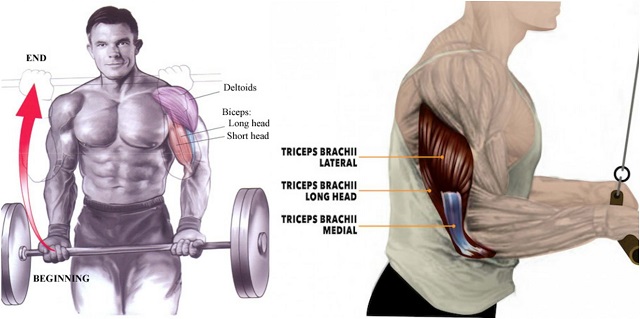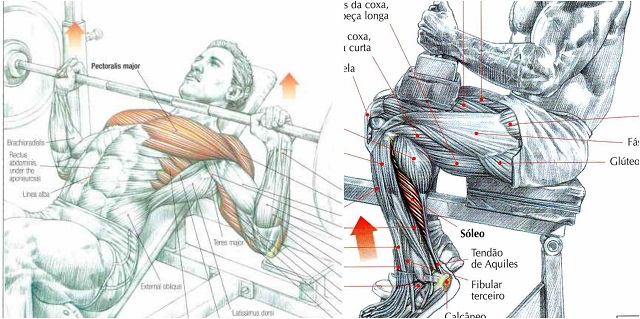A “Super Set” is when you combine two or more exercises back to back with no rest period between the exercises.
Sound simple?
Well, it is. But there are many different combinations and variations of the Super Set that you can use to make it an incredibly powerful training technique in your workouts:
Such As:
– Antagonist Muscle Super Set
– Pre-Exhaust Super Set
– Post-Exhaust Super Set
– Staggered Super Set
Antagonist Muscle Super Set
An antagonist muscle Super Set is when you exercise opposite muscle groups.
For example, doing a set of bicep curls followed by a set of triceps pushdowns.

Antagonist muscle Super Sets are excellent for allowing you to compress workout time while maintaining high strength levels. They are my personal favorite kind of Super Set. When you work for an opposing muscle group directly after the original muscle it helps to actually INCREASE strength in the second muscle group when you work it.
A great example of an antagonistic Super Set would be to train biceps and triceps together. So you would do a bicep exercise like standing barbell curls, followed by a triceps exercise like triceps pushdowns (or vice versa). That will be one “Super Set”. You would then rest for a couple minutes and proceed with your next set and so on. Not only will this save time and work the muscles harder, but it will give you an incredible pump throughout your arms as well.
The best muscle groups to pair up for Antagonist Muscle Super Sets are:
– Chest & Back
– Biceps & Triceps
– Quadriceps & Hamstrings
Pre-Exhaust Super Set
In a pre-exhaust Super Set you work on the same muscle group with an isolation exercise first, and then follow up with a compound exercise immediately after without resting in between sets. This is a great way to help build up your stubborn muscle groups.
For example; let’s say your chest is a stubborn muscle group for you that isn’t growing well. In this case, you probably have a hard time feeling your pecs working when doing chest exercises like the bench press. So a great way to work around this problem is to start with an isolation exercise to pre-exhaust your pecs first, before moving on to your compound exercises after.
So you could start with a set of pec deck flys, immediately followed by a set of barbell bench presses. That will be one “Super Set”. You would then rest for a couple minutes and proceed with your next set and so on.

The pec deck flys will isolate, pump, and pre-exhaust your pecs before you move on to the bench press. Which is a compound pressing exercise that not only works the chest but brings the triceps and shoulders into play as well?
Here are some good examples of Pre-Exhaust Super Sets:
Shoulders:
– dumbbell side lateral raises + barbell shoulder press
Chest:
– pec deck fly + bench press
Biceps:
preacher curls + standing barbell curls
Triceps:
– triceps push downs + close grip bench press
Legs:
– leg extensions + squats
Post-Exhaust Super Set
Another version of super setting is the post-exhaust method. This is the exact opposite of the pre-exhaust Super Set. So instead of starting your target muscle with an isolation move, and finishing with a compound move. You start with the compound move first and finish with the isolation move afterward.
This still works the targeted muscle hard, but it will allow you to lift heavier weight for the compound exercise because your targeted muscle group is not pre-exhausted yet. One method isn’t necessarily better or worse, there are pros and cons to both pre-exhaust and post-exhaust Super Sets. But you could cycle through doing several weeks of pre-exhaust style Super Sets, and then several weeks of doing post-exhaust Super Sets to reap the benefits of both variations.
Staggered Super Set
This type of Super Set pairs up training totally unrelated muscle groups. And it’s a great way to “sneak in” extra training for stubborn hard to grow muscle groups. For example; let’s say your calves are a stubborn body part for you. One way to get extra calve training into your workouts is to Super Set in calve raises with your other body part workouts.

For example, when doing your chest workout you could simply add in a quick set of calve raises after each set. So once you finish up a set of bench presses, go over and rep out a set of calve raises. Then rest a couple minutes and repeat. This would be considered a Staggered Super Set.
You could also do the same thing with abs. Just toss in a set of crunches or leg raises in between your other exercises.
Adding in Staggered Super Sets work best with smaller non-taxing muscle groups such as abs, calves, forearms, etc. You wouldn’t want to stagger set in a big move like deadlifts with your regular workout routine because the deadlift is such a demanding exercise in itself. But you could easily stagger set in calve raises, crunches, or wrist curls with pretty much any other workout.
Super Sets are a VERY effective technique. Give one of these Super Set variations a try in your next workout, and then leave me a comment below letting me know how it works for you!
I bet you’ll be amazed by how much they jack up the training intensity of your workouts and help stimulate new muscle growth!

